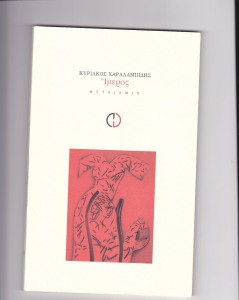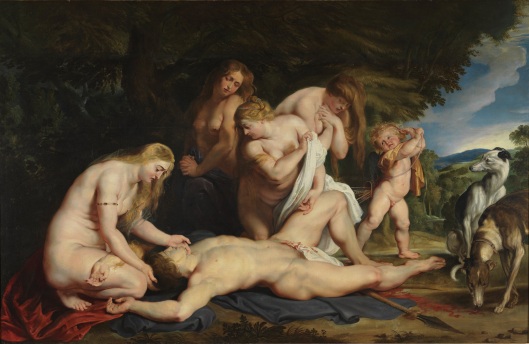Tags
"Yearning" (2012), Adonis, Aphrodite, death of Adonis, Άδωνις, Ίμερος (2012), Αφροδίτη, Κυριάκος Χαραλαμπίδης, θάνατος Αδώνιδος, Kyriakos Charalambides
 The poem “Adonis” is included in Kyriakos Charalambides’ collection Yearning (Ίμερος, Athens: Metaichmio 2012). As the title itself suggests, the figure of Aphrodite, as well as other archetypal symbols of femininity, sensual desire and love, such as Helen, loom large in the collection.
The poem “Adonis” is included in Kyriakos Charalambides’ collection Yearning (Ίμερος, Athens: Metaichmio 2012). As the title itself suggests, the figure of Aphrodite, as well as other archetypal symbols of femininity, sensual desire and love, such as Helen, loom large in the collection.
I provide the original text and a translation. I also attach a comment of the poet’s, which was communicated to Mrs. Konstandia Hadjigeorgiou, graduate student at the Open University of Cyprus.
Both the original and the translation are posted here with the poet’s approval.
*************
ΑΔΩΝΙΣ
Όταν η ροδαυγή άσπριζε τα τζάμια
ΦΛΩΜΠΕΡ
Χαϊδεύει τα μαλλιά του Αδώνιδός της
με θαρραλέο χέρι και του λέει:
«Είσαι καλός εσύ! Πολλοί εραστές μου
ανάλγητοι κι ευνούχοι τοκογλύφοι,
πριν συ τις παπαρούνες πλημμυρίσεις,
προδώσαν της καρδιάς μου το ταμείο.»
Τώρα μονάχη με τις ανεμώνες
να την κοιτάν π’ αμίλητη χαϊδεύει
τ’ Αδώνιδός της τα μαλλιά με χέρι
σαν θαρραλέο και μ’ ατόφια μύρτο
«είσαι καλός εσύ!», του ψιθυρίζει.
**********
ADONIS
When rosy dawn whitened the window glasses
FLAUBERT
She caresses the hair of her Adonis
with a courageous hand and says:
“You are a good one! Many of my lovers,
callous and castrated usurers,
before you inundated the poppies,
betrayed the treasury of my heart.”
Now all alone among the anemones,
being watched as she is silently caressing
her Adonis’ hair with a hand
that looks courageous and with pure myrtle,
“You are a good one!”, she whispers.
**********
THE POET’S COMMENT:
«Ο Άδωνις κείται νεκρός ανάμεσα στις παπαρούνες (που συμβολίζουν και το κόκκινο αίμα του σπαραγμένου από τον κάπρο εραστή). Η Αφροδίτη θρηνεί, αλλ’ όχι μονάχα αυτόν. Θα έλεγε κανείς πως θρηνεί αναδρομικά για τη σπαταλημένη ζωή της, καθώς αναλογίζεται, πάνω από το νεκρό σώμα του Άδωνη, τη δική της νέκρα της ψυχής και την προδομένη από τους άλλους καρδιά της. Το ποίημα αυτό το αγαπώ πάρα πολύ, γιατί η Αφροδίτη είναι ανθρώπινη και τρυφερή συνάμα, τόσο για τον προκείμενο νεκρό όσο και για τον εαυτό της. Τώρα που χάνει και τον Άδωνη, θα πορευτεί μονάχα με την απομένουσα τρυφερότητα για τον εαυτό της. Δες και τη μοίρα της Μαντάμ Μποβαρύ του Φλωμπέρ, από το βιβλίο του οποίου πήρα το σχετικό μότο του ποιήματος. “Όταν η ροδαυγή άσπριζε τα τζάμια”. Εκείνη τη στιγμή, όπου ο χρόνος συναπαντιέται με το θάνατο. Αυτά στο ποίημά μου λειτουργούν φανερά και υποδόρια — αυτό που λέγω είναι και αυτό που κρύβω. Η πραγματικότητα που πλημμυρίζει μια έρημη Αφροδίτη στον κάμπο, με τον νεκρό εμπροστά της, είναι ένα άλλο τοπίο της ψυχής. Η ερήμωση βρίσκεται στη ρίζα της ανθρώπινης μοίρας. Γι’ αυτό και η ποίηση μπορεί να συγκρατεί ένα μέρος από την Ομορφιά, όταν καθίσταται τρυφερή».
“Adonis lies dead in a field of poppies (which also symbolise the red blood of the lover mauled by the boar). Aphrodite mourns, but not for him alone. One might say that she mourns retrospectively for her wasted life, as she ponders, on top of Adonis’ lifeless body, how dead her own soul is and how betrayed by the others her own heart has been. I love this poem very much, because Aphrodite shows tender and simultaneously human emotion, both for the deceased lying in front of her and for her own person. Now that she has lost Adonis, she will have to do only with the tenderness she has kept for herself. Compare also the fate of Flaubert’s Madam Bovary, from whose book I took the poem’s motto: ‘when rosy dawn whitened the window glasses’. That moment, when time meets with death. In the poem these things function both visibly and hypodermically — what I say is also what I hide. The reality that overwhelms a deserted Aphrodite in the field, with the dead man in front of her, is another landscape of the soul. Desolation lies at the root of human fate. It is for this reason that poetry can retain some part of Beauty, when she becomes tender”.

Peter Paul Rubens, “Ο θάνατος του Αδώνιδος” (1614). The Israel Museum, Jerusalem

Pingback: “Adonis”: a poem by K. Charalambides, translated by A.K. Petrides | agelikifotinou
Reblogged this on agelikifotinou.
LikeLiked by 1 person
Pingback: “Adonis”: a poem by K. Charalambides, translated by A.K. Petrides - Φιλολογικός Ιστότοπος